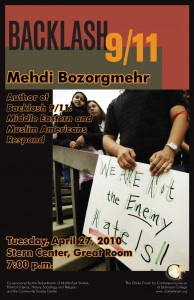Mehdi Bozorgmehr
Associate Professor of Sociology, City University of New York
Backlash 9/11
Tuesday, April 27, 2010
Stern Center, Great Room, 7:00 p.m.
For most Americans, September 11, 2001 symbolizes the moment when their security was altered. For Middle Eastern and Muslim Americans, 9/11 also ushered in a backlash in the form of hate crimes, discrimination, and a string of devastating government initiatives. From the viewpoint of the targeted populations, the backlash spoke louder than official proclamations to the contrary. Instead of capitulating, however, organizations representing Middle Eastern and Muslim Americans mobilized to demonstrate their commitment to the United States while defending their rights. They distanced themselves from terrorists and condemned their actions; educated the public about the Middle East and the Muslim faith; and actively involved their constituents in voter-registration, know-your-rights forums, and civic and political integration activities.
This study provides the first comprehensive analysis of the impact of the post-9/11 events on Middle Eastern and Muslim Americans as well as their organized response for inclusion in America’s social, religious and political mosaic. Through fieldwork and interviews with leaders of community-based organizations across the country, the authors have researched the unfolding of this process since its inception. Backlash 9/11 introduces a Read more





















